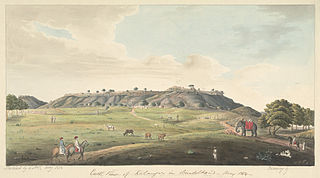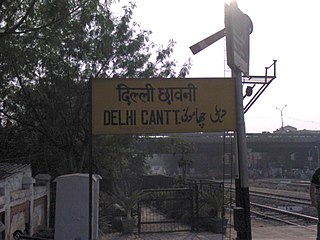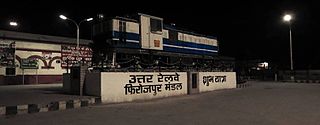Related Research Articles

Solan is a city in the Indian state of Himachal Pradesh and the district headquarters of Solan district. It is located 45.5 kilometres (28 mi) south of the state capital, Shimla. Solan has an average elevation of 1,550 metres (5,090 ft). The city is situated between Chandigarh and Shimla on the Kalka-Shimla National Highway-5. The narrow-gauge Kalka-Shimla railway passes through Solan. Located on the Punjab-Himachal Border, Solan is nestled in the Shivalik hills of the Himalayas.

Banda is a city and a municipal board in Banda district in the state of Uttar Pradesh, India. Banda is divided among north, east, west and south Banda. Banda lies south of the Yamuna river in the Bundelkhand region. It is the administrative headquarters of Banda District. The town is well connected to major cities with railways and state highways. The town is near the right bank of the river Ken, 189 km south-west of Allahabad.

A cantonment is a military quarters. In India and other parts of South Asia, a cantonment refers to a permanent military station. In United States military parlance, a cantonment is, essentially, "a permanent residential section of a fort or other military installation," such as Fort Cavazos.

Kasauli is a town and cantonment, located in the Solan district of the Indian state of Himachal Pradesh. The cantonment was established by the British Raj in 1842 as a Colonial hill station, 25 km (16 mi) from Solan, 77 km (48 mi) from Shimla, 58 km (36 mi) from Chandigarh, and 94 km (58 mi) from Ambala Cantt (Haryana), an important railway junction of North India.

Delhi Cantonment is a Class I Cantonment Board established in 1914. The area of the Cantonment is 10,452 acres (42.30 km2) and the population of the Cantonment as per the 2011 census is 110,351.
Chakrata is a cantonment town and also a sub district/tehsil, in Dehradun district in the state of Uttarakhand, India.
The Indian Defence services have established numerous academies and staff colleges across India for the purpose of training professional soldiers in military sciences, warfare command and strategy, and associated technologies.
Dehu Road Cantt, is a military cantonment in the city of Pune, India, which was established in October 1958. The Dehu Ordnance Depot and Dehu Ammunition Depot was set up in the 1940s.

Ferozepur Cantonment, also known as Firojpur Cantonment and Firojepur Cantonment, is a cantonment town in Firozpur district in the state of Punjab, India. It is located to the south of the city of Firozpur.
Dalhousie cantonment is a town in Dalhousie, just 50 km from Chamba town in Chamba district in the state of Himachal Pradesh, India.

The Ministry of Defence (MoD) or Raksha Mantralay is charged with coordinating and supervising all agencies and functions of the government relating directly to national security and the Indian Armed Forces. The President of India is the ceremonial commander-in-chief of the armed forces of the country. The Ministry of Defence provides policy framework and resources to the armed forces to discharge their responsibility in the context of the country's defence. The Indian Armed Forces and Indian Coast Guard under the Ministry of Defence are primarily responsible for ensuring the territorial integrity of India.

Dabra is a town and municipality in Gwalior district in the state of Madhya Pradesh, India located near NH-44 national highway. It serves the headquarters for both a tehsil and a coterminous community development block.

The Territorial Army (TA) is a military reserve force composed of part-time volunteers who provide support services to the Indian Army. It consists of officers, junior commissioned officers, non-commissioned officers and other personnel who hold ranks identical to those in the Indian Army, and also maintains civilian occupations. The primary role of the TA is to "relieve the regular army from static duties and assist civil administration in dealing with natural calamities and maintenance of essential services" and to "provide units for the regular army as and when required".

Rashtriya Military School, Chail is a residential school in Himachal Pradesh, India. The school's origins lie with the establishment of King George's Royal Indian Military School in Jullunder, Punjab, soon after World War I, with a donation of ₹250,000 from King George V’s patriotic fund. The foundation stone of this school was laid in the Jullunder Cantonment by King George V in February 1922, and the school started functioning in 1925. The school was moved to its present location in Chail, Himachal Pradesh, in 1960. Cadets are known as Georgians after the school's founding father.
Aurangabad Cantonment (Chawni), is a cantonment town in Aurangabad district in the state of Maharashtra, India.
Nowgong is a city of Chhatarpur district of Madhya Pradesh. The town had a population of 11,507 in 1952. Vindhya Pradesh was merged into Madhya Pradesh on 1 November 1956. Nowgaon was declared capital of Madhya Pradesh, but after six months Bhopal became the capital of Madhya Pradesh.

The Indian Defence Estates Service is a Civil Service in the Government of India. Its Cadre Controlling Authority (CCA) is the Ministry of Defence. Civil Services Examination conducted every year by Union Public Service Commission provides a gateway for entry into this service. The Service traces its origin to 16 December 1926 and has been constantly evolving since then. The service was initially known as the Military Lands and Cantonment Service (1926-1983), and then Defence Lands and Cantonment Service (1983-1985). In 1985, it was renamed as the Indian Defence Estates Service. The service is governed by the Indian Defence Estates Service Rules, 2013, where 75% intake is by direct recruitment and 25% by promotion.

Lt General Vijay Lall, PVSM, AVSM, ADC is a veteran Indian Army General Officer. His military career spanned about four decades, where he last served as the 15th Indian Director General Ordnance Services of the Army. He was also the Senior Colonel Commandant AOC. Vjay is the 1st Director General Ordnance Services of this new millennium.
References
- ↑ "Cantonments Act, 2006" (PDF). Archived from the original (PDF) on 2014-05-31. Retrieved 2014-08-02.
- ↑ Ministry of Defence (1 August 2014). "Election for Cantonment Boards". PIB. Retrieved 2 August 2014.
- ↑ Indian Defence Estates Service Rules, 2013. Government of India. 2013.
- ↑ "Annual Administration Report 2020-21" (PDF). dgde.gov.in. Directorate General Defence Estates, Ministry of Defence. p. 5. Retrieved 4 May 2022.
There are 62 Cantonments in the country located in 19 States/UT
- ↑ cantonment board of Delhi. "functions and Duties" (PDF). Archived from the original (PDF) on September 13, 2014. Retrieved August 2, 2014.